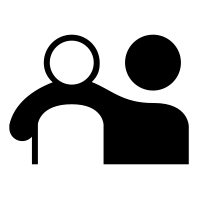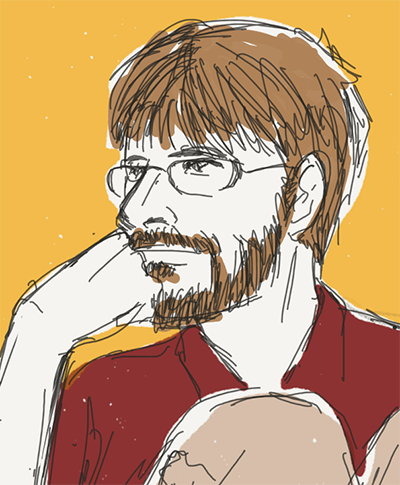
Photo:
Phone: +1-617-496-1876
Office: SEC, Room 2.331
Mastodon:@kgajos@hci.social
Current CV
Office Hours
Please sign up online. Openings are typically 15 minutes each. If you need more time, sign up for more than one opening.
Join our group!
- As a graduate student
- As a postdoctoral fellow
- As an undergraduate researcher (Harvard undergrads only)
Visit our Lab in the Wild!
Can you tell just by looking at a meal whether it is a significant source of protein, fat, or carbohydrates? Find out and compare yourself to others.
The test typically takes 10 minutes.
Try it!
Let us help you figure it out and compare yourself to others.
The test takes 10-15 minutes and it works on mobile devices.
Try it!
Bio and Research Interests
I am a Gordon McKay Professor of Computer Science at the Harvard Paulson School of Engineering and Applied Sciences. I lead the Intelligent Interactive Systems Group at Harvard. Currently, my group has the following focus areas:
- Principles and applications of intelligent interactive systems. How do we build AI-powered systems such that they are well suited for the strengths and limitations of human cognition, perception and behavior?
- Behavioral research at scale. We are building platforms (e.g., Lab in the Wild and Hevelius) that allow us to conduct behavioral research with tens of thousands of participants. We are interested both in developing new tools and methods, and in doing novel science that such tools enable.
- Design for equity and social justice. Design impacts human behavior (seriously). Some of our design practices may inadvertently exacerbate inequalities. Thoughtful design can also improve support more equitable and more socially just outcomes. This interest originates from our work on accessible computing, but has expanded to include implicit bias, equitable access to healthcare, and more.
In the past, I made contributions in the following areas (which are still of some interest, just not the main focus of my current work): accessible computing, adaptive user interfaces, creativity support, crowd computing.
If you wish to see what I do, you can read a summary of the main research themes in my work or check out some of our tests on Lab in the Wild -- in 10 minutes you can learn something intersting about yourself and compare your results to the results of other people.
If you are interested in joining me as a graduate student, please apply through the School of Engineering and Applied Sciences or read the information for prospective graduate students.
Before Harvard
In June 2008, I graduated from University of Washington and I subsequently joined the Adaptive Systems and Interaction group at Microsoft Research for a one year post doc.
While at the University of Washington, I built the SUPPLE system for automatically generating personalized user interfaces. A short video illustrates how SUPPLE can generate user interfaces adapted to people's motor and vision abilities.
In the Fall of 2005, I was visiting faculty at the Ashesi University in Accra, Ghana, where I taught Introduction to Artificial Intelligence.
Before coming to the University of Washington, I spent seven years at MIT where I earned my Bachelors and Masters degrees, and where I also worked for two years as a research scientist managing the operations of the Intelligent Room Project and coordinating some of the activities related to Project Oxygen at the MIT AI Lab (currently part of CSAIL).
News
Wednesday, May 20: Our paper showing that Proxy Tasks and Subjective Measures Can Be Misleading in Evaluating Explainable AI Systems was recognized as a best paper at the ACM IUI'20 conference. Here is a blog post summarizing the work.
Tuesday, May 12:
 Predictive text systems change what we write. When our phones suggest the next word to type, they not only help us enter text faster (well, sometimes), they also nudge us to change the content of what we write. Here's the paper and a blog post. This result extends our earlier work that showed that sentiment bias in predictive text recommendations results in biased writing.
Predictive text systems change what we write. When our phones suggest the next word to type, they not only help us enter text faster (well, sometimes), they also nudge us to change the content of what we write. Here's the paper and a blog post. This result extends our earlier work that showed that sentiment bias in predictive text recommendations results in biased writing.
2019
Monday, March 18:
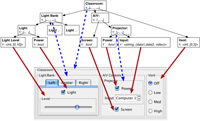 Our paper, SUPPLE: automatically generating user interfaces, which Dan Weld and I published in 2004, was recognized with The Most Impact Paper Award at IUI 2019. Here is a brief synthesis of the paper and our subsequent research.
Our paper, SUPPLE: automatically generating user interfaces, which Dan Weld and I published in 2004, was recognized with The Most Impact Paper Award at IUI 2019. Here is a brief synthesis of the paper and our subsequent research.
2018
Monday, September 17: We have released the SEAS Climate Report with the results of the climate survey we conducted in the spring. Some key results: 1. Harassment and discrimination occur at SEAS and have large negative impact on all aspects of a person's life (personal well-being, professional development, and all other concepts we measured); 2. There are substantial disparities related to disability status, gender identity and minority status.
Saturday, August 3:
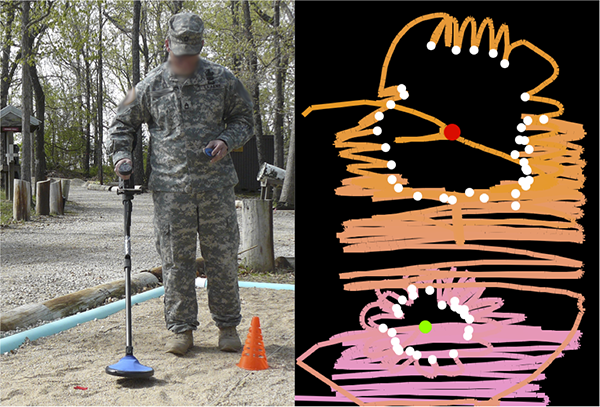 We have just learned that Lahiru Jayatilaka's paper PETALS: Improving Learning of Expert Skill in Humanitarian Demining was recognized as a Best Paper of ACM COMPASS 2018.
We have just learned that Lahiru Jayatilaka's paper PETALS: Improving Learning of Expert Skill in Humanitarian Demining was recognized as a Best Paper of ACM COMPASS 2018.
2017
Friday, August 18: We have an open position for an HCI postdoctoral fellow.
Monday, March 27:
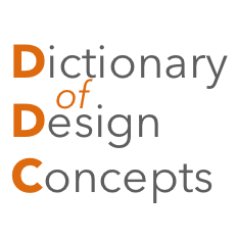 I find myself re-explaining the same core design concepts in my classes year after year. To help myself and my students, I've started a Dictionary of Design Concepts to capture the really timeless and universal principles, design patterns, perceptual mechanisms, and other relevant concepts that designers of useful and usable interactive systems should know.
I find myself re-explaining the same core design concepts in my classes year after year. To help myself and my students, I've started a Dictionary of Design Concepts to capture the really timeless and universal principles, design patterns, perceptual mechanisms, and other relevant concepts that designers of useful and usable interactive systems should know.
Wednesday, Feb 1: Our new paper in Environmental Health Perspectives: a system to report back individual results of biomonitoring studies to study participants. In the past, researchers feared that people could not handle the complex and potentially upsetting information about what chemicals were found in their tissues and environment. No more. If results are presented correctly, participants can understand and act on the results. Our system makes it easier to author and deliver personalized results at scale. This work was led by our colleagues at the Silent Spring Institute.
Monday, January 16: Our upcoming HRI'17 paper led by Serena Booth: can a robot talk its way into an access-controlled student dormitory? Robot succeeded in getting past the locked door 19% of the time when it asked an individual student to let it enter. When it asked a group of students, it succeed 76% of the time! But when the robot was dressed as a food delivery agent for the fictional start-up Robot Grub (and was carrying a box of cookies in a clear case), individuals suddenly became much more trusting: 71% of the individuals allowed the cookie-carrying robot into the dorm. Surprisingly, people who identified the robot as a potential bomb threat were just as likely to open the door as those who did not.
These results demonstrate the existence of overtrust---the belief that the robot does not intend to deceive or carry risk.
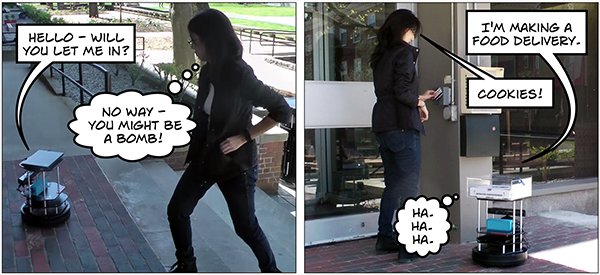
Monday, January 9:
 Our upcoming ACM IUI 2017 paper reports new findings from the Multitasking Test on LabintheWild: given a choice to either do more clicking or exert more mental effort to get a job done, introverts and people with high need for cognition lean toward more mental effort, while extroverts and people with low need for cognition click more. This suggests that not all people benefit equally from some of the effort saving features of modern user interfaces. For more, see a blog entry that contextualizes the findings or read the paper.
Our upcoming ACM IUI 2017 paper reports new findings from the Multitasking Test on LabintheWild: given a choice to either do more clicking or exert more mental effort to get a job done, introverts and people with high need for cognition lean toward more mental effort, while extroverts and people with low need for cognition click more. This suggests that not all people benefit equally from some of the effort saving features of modern user interfaces. For more, see a blog entry that contextualizes the findings or read the paper.
2016
Thursday, Sept 22:
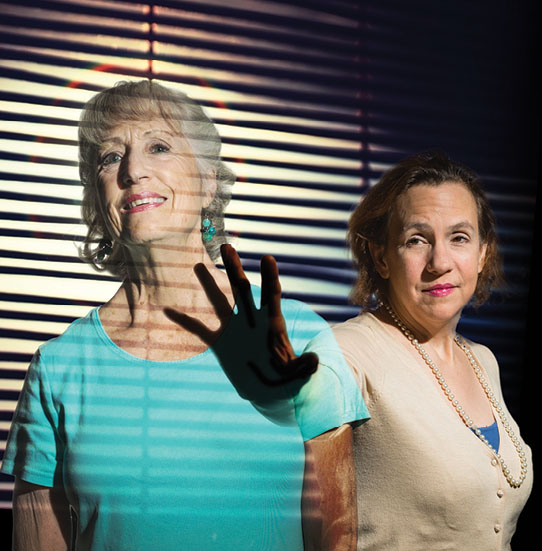 On Thursday, Barbara and I will get to pontificate about science fiction. Can't wait! Barbara and I will be part of the Scholar Social after the evening performance of a science fiction-ish play Marjorie Prime at the Central Square Theater.
On Thursday, Barbara and I will get to pontificate about science fiction. Can't wait! Barbara and I will be part of the Scholar Social after the evening performance of a science fiction-ish play Marjorie Prime at the Central Square Theater.
Wednesday, August 10: A new paper: Acceptance of Mobile Technology by Older Adults: A Preliminary Study" led by Sunyoung Kim, to be presented at MobileHCI '16 in Florence. This paper captures the results of our deep dive into the grounded theory method to understand how older adults make decisions about adopting (or not adopting) new mobile technologies. A key finding is that even if an older adult perceives a technology as useful and easy to use by others, they may still decide that the technology is too difficult for them to learn. This explicit stage of evaluating the ease of learning a new technology appears to be specific to older adults and does not appear in other technology adoption models.
Tuesday, July 12:
 Ofra Amir presented our paper introducing Mutual Influence Potential Networks: Enabling Information Sharing in Loosely-Coupled Extended-Duration Teamwork at IJCAI'16. This paper contributes to our larger effort to understand and support teamwork in complex healthcare.
Ofra Amir presented our paper introducing Mutual Influence Potential Networks: Enabling Information Sharing in Loosely-Coupled Extended-Duration Teamwork at IJCAI'16. This paper contributes to our larger effort to understand and support teamwork in complex healthcare.
Saturday, April 30:
UIST 2017 will take place in Quebec City, October 22-25, 2017. I am the general chair. Jenn Mankoff and Chris Harrison will lead the program committee. Please help spread the word on FB and Twitter.
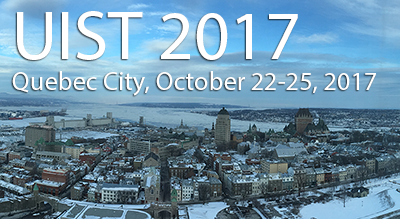
Thursday, March 10:
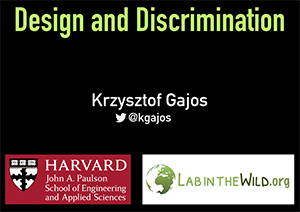 The currently prevalent one-size-fits-all approach to designing digital products inadvertently--but inevitably--leads to discrimination by making some people systematically a little more likely to succeed than others. That's the premise of my recent talk on Design and Discrimination. In it, I first show how current design practice discriminates against people based on their motor abilities, their ability to perceive color or their subjective perception of what is aesthetically pleasing. I then present a Computer Scientist's approach to this problem: algorithms that automatically personalize design to provide more equitable access to digital resources.
The currently prevalent one-size-fits-all approach to designing digital products inadvertently--but inevitably--leads to discrimination by making some people systematically a little more likely to succeed than others. That's the premise of my recent talk on Design and Discrimination. In it, I first show how current design practice discriminates against people based on their motor abilities, their ability to perceive color or their subjective perception of what is aesthetically pleasing. I then present a Computer Scientist's approach to this problem: algorithms that automatically personalize design to provide more equitable access to digital resources.
2015
Monday, December 21: Web site launched for CS 179: Design of Useful and Usable Interactive Systems -- an undergraduate introduction to design thinking and human-computer interaction.
Monday, December 14: We have our first 5 papers accepted for presentation in 2016 (at CHI, IUI and L@S):
- Ingenium: Engaging Novice Students with Latin Grammar" (CHI, led by Sharon Zhou)
- Learning From the Crowd: Observational Learning in Crowdsourcing Communities" (CHI, led by Lena Mamykina at Columbia)
- Curiosity Killed the Cat, but Makes Crowdwork Better" (CHI, led by Edith Law at U. Waterloo)
- ChordRipple: Recommending Chords to Help Novice Composers Go Beyond the Ordinary" (IUI, led by Anna Huang)
- AXIS: Generating Explanations at Scale with Learnersourcing and Machine Learning" (L@S, led by Joseph Williams)
Thursday, November 12: My colleagues in engineering and I have an opportunity for a postdoctoral fellow to join us in developing new software tools to support engineering education.
Saturday, August 28: This semester I am co-teaching Societies of the World 47: Contemporary Developing Countries: Entrepreneurial Solutions to Intractable Social and Economic Problems. Led by prof. Tarun Khanna from Harvard Business School and co-taught by faculty from medicine, humanities and the GSD (and me), this course brings a fiercely interdisciplinary approach to some of the world's toughest problems. Join us! Mondays and Wednesdays 3:30–5:00 pm in Sever Hall Rm 113.
Thursday, July 30: Juho defended his thesis on Learnersourcing: Improving Learning with Collective Learner Activity. After a brief postdoc at Stanford, he is going to become a professor at KAIST. Congrats!
Monday, July 20: We are organizing a AAAI Spring Symposium on Intelligent systems for supporting distributed human teamwork to bring together researchers in Social Sciences, HCI and AI in pursuit of novel approaches for supporting the increasingly more distributed and more complex teamwork. The deadline for submitting position papers is on October 9. Organizers include Ofra Amir, Ya’akov (Kobi) Gal, Barbara Grosz, Jonathan Grudin, Robert Kraut, Gary Olson and Peter Stone. Please consider joining us!
Friday, March 27: Our paper showing that Providing timely examples improves the quantity and quality of generated ideas" has been accepted to the ACM Creativity and Cognition conference. This is part of our larger effort to develop computational tools to support collective creative experience.
Monday, March 2: Our CSCW'15 paper on LabintheWild and our CHI'15 paper on Opportunities for Computer Support of Teamwork in Complex Healthcare have each been recognized with an honorable mention at their respective conferences.
Monday, February 23: A brief news post capturing the aspirations for the course I teach (CS 179: Design of Useful and Usable Interactive Systems).
Wednesday, February 11: MIT has just put out a press release about our work on learnersourcing.
Friday, January 9: Our CHI'15 paper on Opportunities for Computer Support of Teamwork in Complex Healthcare is now available online.
2014
Monday, November 3: Our CSCW'15 paper Toward Collaborative Ideation at Scale -- Leveraging Ideas from Others to Generate More Creative and Diverse Ideas" is now available online!
Sunday, November 2: Our Learnersourcing paper for CSCW is now available. Learnersourcing is an approach in which intrinsically motivated learners contribute to a human computation workflow as they naturally engage in a meaningful learning activity. Want to see what this looks like? Check out our Crowdy system for learnersourcing subgoal labels for tutorial videos.
Tuesday, October 14:
 Our CSCW paper on LabintheWild is ready.
Our CSCW paper on LabintheWild is ready.
Friday, September 12: At the AAAI Fall Sumposium on Expanding the Boundaries of Health Informatics Using AI, Ofra will reveal our secret plan to use AI to support teamwork for coordinated care of children with complex conditions.
Monday, September 1: We will be presenting three papers at CSCW'15:
- "Toward Collaborative Ideation at Scale — Leveraging Ideas from Others to Generate More Creative and Diverse Ideas" -- new crowd- and machine learning--powered system to pick out sets of diverse high quality examples of ideas generated by earlier contributors to inspire future contributors. Increases quality and diversity of generated ideas.
- "Learnersourcing Subgoal Labels for How-to Videos" -- today's learners make tutorial videos even better for future learners by contributing to non-trivial human computation tasks as a byproduct of doing things that they are already motivated to do.
- "LabintheWild: Conducting Large-Scale Online Experiments With Uncompensated Samples" -- data obtained through LabintheWild are as good as the data collected in traditional lab-based studies.
Tuesday, August 12: The focus of this year's CS 279 will be social computing and crowd-powered systems. Specifically, we will look at the design and analysis of systems, in which crowds of intrinsically motivated volunteers contribute to meaningful and non-trivial human computation tasks as a byproduct of doing something that they are motivated to do anyway. The course is designed for first year grads from all areas. Advanced undergraduates are also welcome, particularly those who wish to do reserach (or write a thesis) in an area related to Human-Computer Interaction.
Monday, August 11: Juho's work on LectureScape (the paper will be presented at UIST'14) just got nice coverage on Forbes.com. It also got mentioned here. There is a video if you want to learn more.
 Monday, July 7:
LabintheWild is turning 2!
Monday, July 7:
LabintheWild is turning 2!
Sunday, June 29: We have a postdoctoral position available for an education-related project.
Tuesday, June 24: Two of our papers (both lead by Juho Kim) got conditionally accepted to UIST'14: "Data-Driven Interaction Techniques for Improving Navigation of Educational Videos" and "Content-Aware Kinetic Scrolling for Supporting Web Page Navigation". See you in Hawaii!
Tuesday, May 20: Want to learn web programming? Check out Crowdy, a better way to learn from video tutorials. This project is run by our frients at MIT CSAIL.
Thursday, May 15: Ken Nakayama (psychology), Ryan Enos (government) and I received a grant from the Harvard Initiative for Learning and Teaching for integrating online behavioral research modules into the classroom. Essentially, we want to bring the kind of experiential learning (lecture demonstrations, open-ended labs) that is common in natural sciences to education in psychology, social sciences and HCI.
Sunday, April 27:
 Steve presented his work on Organic Peer Assessment at the Learning Innovation at Scale workshop at CHI.
Steve presented his work on Organic Peer Assessment at the Learning Innovation at Scale workshop at CHI.
Friday, February 7: Our paper on Crowdsourcing Step-by-Step Information Extraction to Enhance Existing How-to Videos will be recognized with an Honorable Mention at CHI'14.
Friday, January 24: The final version of our paper on Understanding In-Video Dropouts and Interaction Peaks in Online Lecture Videos (to appear at Learning at Scale conference) is now available.
Sunday, January 19: Curio and Lab in the Wild are featured in an article on Popular Science in the current issue of Harvard Magazine.
Friday, January 17: The final versions of our CHI'14 papers are now available:
- Quantifying Visual Preferences Around the World (the data set and other additional resources will be available online soon)
- Crowdsourcing Step-by-Step Information Extraction to Enhance Existing How-to Videos
Friday, January 17: The final versions of our IUI'14 papers are now available:
- Adaptive Click-and-Cross: Adapting to Both Abilities and Task Improves Performance of Users With Impaired Dexterity
- Active Learning of Intuitive Control Knobs for Synthesizers Using Gaussian Processes
Friday, December 20: Our paper on Understanding In-Video Dropouts and Interaction Peaks in Online Lecture Videos led by Juho Kim has been accepted to Learning at Scale.
Monday, December 9: Two of our papers got accepted to CHI: "Quantifying Visual Preferences Around the World" led by Katharina Reinecke and "Crowdsourcing Step-by-Step Information Extraction to Enhance Existing How-to Videos" led by Juho Kim.
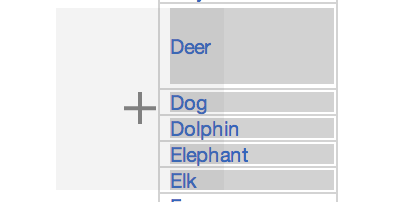 Thursday, December 5: Our two papers got accepted to ACM IUI: "Adaptive Click-and-Cross: Adapting to Both Abilities and Task Improves Performance of Users With Impaired Dexterity" led by Louis Li and "Active Learning of High-Level Knobs for Synthesis with Gaussian Processes" led by Anna Huang.
Thursday, December 5: Our two papers got accepted to ACM IUI: "Adaptive Click-and-Cross: Adapting to Both Abilities and Task Improves Performance of Users With Impaired Dexterity" led by Louis Li and "Active Learning of High-Level Knobs for Synthesis with Gaussian Processes" led by Anna Huang.
Thursday, November 14: Today we ran a panel on Taking Research Out Into the Wild. Main message: engaging broader publics over the internet (either as participants or as collaborators) makes answering entirely new kinds of questions possible and it does not require superhuman abilities or resources.
 Sunday, October 27: In collaboration with the Center for Research on Computation and Society (CRCS), we are now accepting applications for 1- or 2-year Postdoctoral Fellowships. Consider applying even if you are currently seeking a faculty position. Many schools will let you defer your faculty position for a year and a Fellowship at CRCS is a great way to develop your research agenda and to expand your research network.
Sunday, October 27: In collaboration with the Center for Research on Computation and Society (CRCS), we are now accepting applications for 1- or 2-year Postdoctoral Fellowships. Consider applying even if you are currently seeking a faculty position. Many schools will let you defer your faculty position for a year and a Fellowship at CRCS is a great way to develop your research agenda and to expand your research network.
 Friday, October 25: Our team (led by Mary Regan at UMD School of Nursing) received an R01 NIH grant to study the behavioral and nutritional factors impacting pre-term birth. A key technical enabler of this project is a mechanism, based on our PlateMate system, for scalable nutritional analysis, which will make it possible to track the nutritional intake of 400 pregnant women for several months each.
Friday, October 25: Our team (led by Mary Regan at UMD School of Nursing) received an R01 NIH grant to study the behavioral and nutritional factors impacting pre-term birth. A key technical enabler of this project is a mechanism, based on our PlateMate system, for scalable nutritional analysis, which will make it possible to track the nutritional intake of 400 pregnant women for several months each.
 Monday, October 21: Louis Li presented a poster on his work on Adaptive Click-and-Cross at the ACM ASSETS conference. Adaptive Click-and-Cross combines several adaptive mechanisms (which were previously studied in isolation) to improve the efficiency of computer access for people with impaired dexterity.
Monday, October 21: Louis Li presented a poster on his work on Adaptive Click-and-Cross at the ACM ASSETS conference. Adaptive Click-and-Cross combines several adaptive mechanisms (which were previously studied in isolation) to improve the efficiency of computer access for people with impaired dexterity.
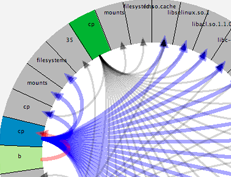 Wednesday, October 16: Our paper reporting on an Evaluation of filesystem provenance visualization tools was presented today at IEEE InfoVis.
Wednesday, October 16: Our paper reporting on an Evaluation of filesystem provenance visualization tools was presented today at IEEE InfoVis.
 Saturday, October 12: The first results from the age guessing experiment: 17-year olds are the most efficient clickers. Past the age of 25, we all get slower at a steady rate for the rest of our lives. Read more...
Saturday, October 12: The first results from the age guessing experiment: 17-year olds are the most efficient clickers. Past the age of 25, we all get slower at a steady rate for the rest of our lives. Read more...
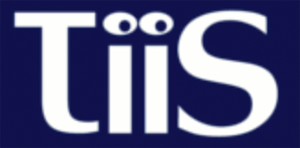 Friday, October 11: I have joined Tony Jameson as a co-Editor in Chief of the ACM Transactions on Interative Intelligent Systems (TiiS). I am helping fill the unfillable gap left by the passing of John Riedl, who was one of the two founding EICs of the journal. TiiS aims to be the primary venue for research that bridges HCI and AI (both broadly construed). Please consider submitting.
Friday, October 11: I have joined Tony Jameson as a co-Editor in Chief of the ACM Transactions on Interative Intelligent Systems (TiiS). I am helping fill the unfillable gap left by the passing of John Riedl, who was one of the two founding EICs of the journal. TiiS aims to be the primary venue for research that bridges HCI and AI (both broadly construed). Please consider submitting.
Sunday, Sept 22: Reminder: CrowdCamp applications are due on Sept 25! Next CrowdCamp (a two-day hack-a-thon for prototyping novel crowd-powered ideas) will take place at HCOMP'13 and will be lead by a great team: Lydia Childton (UW), Juho Kim (MIT) and Pao Siangliulue (Harvard).
 Sunday, September 8: At HCOMP 2013, we will present a demo of Curio, a crowdsourcing platform that connects interested citizens with researchers to help answer important questions in the sciences and humanities.
Read the abstract.
Sunday, September 8: At HCOMP 2013, we will present a demo of Curio, a crowdsourcing platform that connects interested citizens with researchers to help answer important questions in the sciences and humanities.
Read the abstract.
Monday, September 1: Detailed timeline is now available for CS 279: Topics in Human-Computer Interaction Research. The course is designed for first year grads from all areas and for dvanced undergrads, particularly those who wish to do reserach (or write a thesis) in an area related to Human-Computer Interaction. Special focus this year is on human-computer interaction research at scale, i.e., large-scale online experiments, crowdsourcing, and social media analysis. Class will meet on Tuesdays and Thursdays, 10-11:30am, in Pierce 100F.
Monday, July 22: on Monday, July 15, John Riedl passed away. John was best known for his pioneering work on recommender systems and social computing. I found John's research particularly admirable because it combined exciting technical contributions with deep insights into social psychology, thus merging the technical and the human in ways that were rigorous, informative and inspiring. Several years ago, John became the founding editor of the ACM Transactions on Interactive Intelligent Systems (TiiS), a flagship journal for research combining advances in AI and Machine Learning with rigorous insights into Human-Computer Interaction.
Steven Snyder wrote a more extensive piece in memory of John. If you would like to honor John's memory in a more tangible way, you can donate to a scholarship fund set up by University of Minnesota in John's memory.
 Saturday, July 20: At long last, we have published a data set to accompany our 2011 PlateMate paper. The data set contains 16 out of the 18 images we used to evaluate PlateMate's accuracy. The data set also includes the ground truth nutritional info for each photograph, expert estimates, as well as PlateMate's estimates.
Saturday, July 20: At long last, we have published a data set to accompany our 2011 PlateMate paper. The data set contains 16 out of the 18 images we used to evaluate PlateMate's accuracy. The data set also includes the ground truth nutritional info for each photograph, expert estimates, as well as PlateMate's estimates.
 Monday, June 24: We are gearing up to launch Curio, a crowdsourcing platform that connects interested citizens with researchers to help answer important questions in the sciences and humanities. Sign up now to receive an early access invitation!
Monday, June 24: We are gearing up to launch Curio, a crowdsourcing platform that connects interested citizens with researchers to help answer important questions in the sciences and humanities. Sign up now to receive an early access invitation!
 Friday, May 31: More than 500,000 people have participated in experiments on Lab in the Wild.
Friday, May 31: More than 500,000 people have participated in experiments on Lab in the Wild.
 Friday, April 19: More than 100,000 people have participated in experiments on Lab in the Wild.
Friday, April 19: More than 100,000 people have participated in experiments on Lab in the Wild.
Tuesday, March 5: A few days ago at CrowdCamp, we have experimented with new ways to elicit creative ideas from crowds by combining techniques from Design, Improv Theater, Crowdsourcing, and AI. Here's our story.
Thursday, February 14: I was selected as one of the 2013 Sloan Research Fellows. Big thanks to my students, postodcs, and colleagues.


